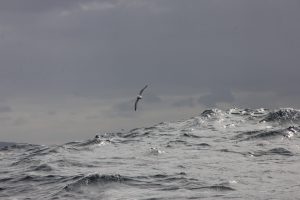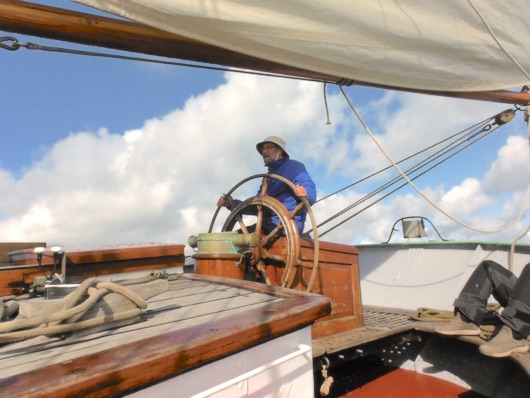Rob’s personal philosophy of holistic ecosystem management and a local, community-based approach to conservation stems from his long-time devotion to environmental advocacy. A philosophy strengthened by his friendships with QLF Staff and fellow environmental educators, Rob continues to campaign for local environmental causes in Massachusetts today.
QLF Experiences
QLF Alumni Congress, Barcelona, Catalonia, Spain, 2016
Observations and Conversations ~
Playing with fiddler crabs and minnows on the beach in Cape Cod spawned then eight-year-old Rob Moir’s lifelong interest in ecology. Rob fondly remembers creating “little enclosures” of sand for the different animals he and his cousins would find on the beach near his grandmother’s house on Cape Cod, then releasing them and watching them “rush back into the ocean again.” Although he no longer catches minnows with beach towels, Rob continues to approach his current work in environmental advocacy with the same experiential and observation-based attitude. Most recently, he began raising awareness on how to prevent eutrophication along the Massachusetts shoreline after paddling through a large algal bloom on a boating trip. As a teenager, Rob started out stuffing envelopes for various activist causes, but what truly drew him to political activism and advocacy was the passion and inspiring team spirit he discovered among activists. He enjoyed “people coming together on campaigns.” Rob’s initial activism led to co-founding Ocean Champions, an organization that strives to promote Congressional candidates devoted to ocean protection. His work with Ocean Champions centers around relationship-building, initiating conversations with representatives, and coordinating the timing of environmental legislation with constituent support. Currently, Rob serves as Executive Director and Founder of the Ocean River Institute (ORI), an organization dedicated to using a local, community-based approach to stewardship, environmental education, and conservation. ORI supports local environmental groups by helping to increase fundraising and restoring watershed capacity. Rob’s philosophy is that “you have to grow from the bottom up,” initiating conversations with stakeholders about conservation and supporting other organizations that share the same philosophy.

A Fulmar at sea, 2017 Photograph Courtesy of Rob Moir
Rob created ORI because he saw the need to shift “the paradigm… and transform environmental advocacy” to rallying around environmental leaders and engaging in collaborative conversations. ORI’s current campaign against eutrophication and the resulting harmful algal blooms reflects this; it centers around communicating with Massachusetts homeowners about the adverse effects that over-fertilization has on their lawns and fighting for governmental regulation on the use of quick-release fertilizers. Rob and his team focus on a few towns at a time, asking people to pledge not to use chemical fertilizers. Without chemical fertilization, chemical runoff into large water bodies is limited, grassroots can grow deeper into the soil, reducing the need for constant watering and improving watershed capacity, and lawns can better act as “carbon sinks”, removing CO2, the primary greenhouse gas from the atmosphere. Rob’s current ORI campaign against quick-release fertilizers serves several key purposes, including preventing eutrophication, which can lead to dead zones in the ocean, helping lobstermen who struggle with algal blooms adhering to their lines and traps and strengthening the symbiosis of grassroots, fungi, and bacteria, natural soil builders, that feed on carbon dioxide drawn down from the air and photosynthesized by plants. Increasing soil abundance further improves watershed capacity.
A Holistic Ecosystem Approach~
Prior to founding ORI, Rob partook in many roles. He worked as an Assistant Scientist for the Sea Education Association, as a Curator of Natural History at the Peabody Essex Museum, and as a Consultant for the Ocean Conservancy. Across positions, Rob approaches the environment with “systems thinking… and does not delineate the world of the otter and the salmon as separate from the whale or the pond frog.” He continuously works towards comprehensive management of the entire ecosystem, connecting current projects he is working on to broader concepts and ideas. For instance, when he was in college, Rob narrated commercial whale watches, pointing out birds and other wildlife on the tour. “Because people were interested in whales, it was an opportunity to teach them about the ocean and to embrace the understanding that the health of the whales is dependent on the health of the ocean… I saw this platform as an opportunity to advance environmental education.” When Rob began working in marine education, early in his career, he came into contact with QLF staff who were likewise passionate about environmental education. Notably, Rob and QLF’s Tom Horn served on the board of the Gulf of Maine Marine Education Association together. The two would drive to board meetings, conversing about marine education and local engagement. Often, Rob also invited Kathleen Blanchard, QLF’s Director of Biodiversity Conservation, to speak and take part in programs at the Peabody Essex Museum, while he was Curator of Natural History. Rob admires how “QLF is all about teamwork” and “working with the local people.” He finds the relationships he has developed throughout the years with QLF staff personally rewarding. During the current pandemic, Rob continues to connect people and facilitate environmental conversations through virtual means of communication. Last fall, he planned a conference for the Ocean River Institute. For Rob, “it’s all about relations,” learning from the teamwork he developed in his youth catching fiddler crabs in the sand with his cousins to engaging in monthly dialogues concerning ocean management today.






